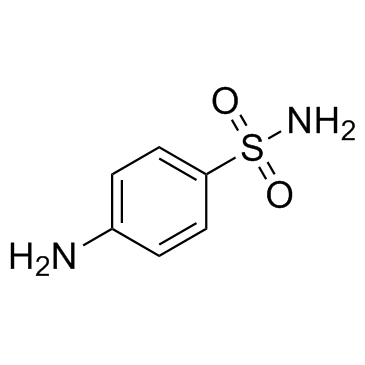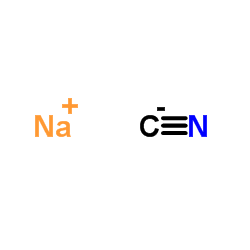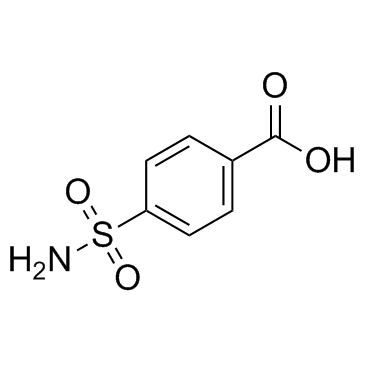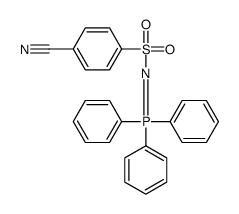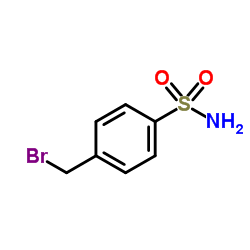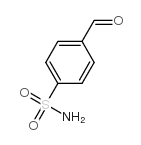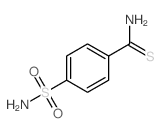3119-02-6
| 中文名 | 4-氰基苯磺酰胺 |
|---|---|
| 英文名 | 4-cyanobenzenesulfonamide |
| 中文别名 | 对氰基苯磺酰胺 |
| 英文别名 |
p-canobenzenesulfonamide
MFCD00178767 Benzenesulfonamide,4-cyano 4-Cyanobenzenesulphonamide EINECS 221-492-5 Benzenesulfonamide,p-cyano p-Cyanobenzenesulfonamide 4-CYANOBENZENE-1-SULFONAMIDE 4-Cyanobenzenesulfonamide 4-cyano-benzenesulfonic acid amide 4-cyano-1-sulfamoylbenzene p-Cyanobenzenesulphonamide 4-Cyan-benzolsulfonsaeure-amid |
| 密度 | 1.5±0.1 g/cm3 |
|---|---|
| 沸点 | 400.7±47.0 °C at 760 mmHg |
| 熔点 | 166ºC |
| 分子式 | C7H6N2O2S |
| 分子量 | 182.200 |
| 闪点 | 196.2±29.3 °C |
| 精确质量 | 182.014999 |
| PSA | 92.33000 |
| LogP | 0.23 |
| 蒸汽压 | 0.0±0.9 mmHg at 25°C |
| 折射率 | 1.626 |
| 储存条件 | 室温,干燥密封 |
Synonym:None Known Section 2 - COMPOSITION, INFORMATION ON INGREDIENTS
Risk Phrases: 20/21/22 Section 3 - HAZARDS IDENTIFICATION EMERGENCY OVERVIEW
Harmful by inhalation, in contact with skin and if swallowed.The toxicological properties of this material have not been fully investigated. Potential Health Effects Eye: May cause eye irritation. Skin: May cause skin irritation. Harmful if absorbed through the skin. Ingestion: Harmful if swallowed. May cause irritation of the digestive tract. The toxicological properties of this substance have not been fully investigated. Inhalation: Harmful if inhaled. May cause respiratory tract irritation. The toxicological properties of this substance have not been fully investigated. Chronic: No information found. Section 4 - FIRST AID MEASURES Eyes: In case of contact, immediately flush eyes with plenty of water for at least 15 minutes. Get medical aid. Skin: In case of contact, flush skin with plenty of water. Remove contaminated clothing and shoes. Get medical aid if irritation develops and persists. Wash clothing before reuse. Ingestion: If swallowed, do not induce vomiting unless directed to do so by medical personnel. Never give anything by mouth to an unconscious person. Get medical aid. Inhalation: Remove from exposure and move to fresh air immediately. If not breathing, give artificial respiration. If breathing is difficult, give oxygen. Get medical aid. Notes to Physician: Treat symptomatically and supportively. Section 5 - FIRE FIGHTING MEASURES General Information: As in any fire, wear a self-contained breathing apparatus in pressure-demand, MSHA/NIOSH (approved or equivalent), and full protective gear. During a fire, irritating and highly toxic gases may be generated by thermal decomposition or combustion. Extinguishing Media: Use water spray, dry chemical, carbon dioxide, or chemical foam. Section 6 - ACCIDENTAL RELEASE MEASURES General Information: Use proper personal protective equipment as indicated in Section 8. Spills/Leaks: Vacuum or sweep up material and place into a suitable disposal container. Clean up spills immediately, observing precautions in the Protective Equipment section. Avoid generating dusty conditions. Provide ventilation. Section 7 - HANDLING and STORAGE Handling: Wash thoroughly after handling. Use with adequate ventilation. Minimize dust generation and accumulation. Avoid breathing dust, vapor, mist, or gas. Avoid contact with eyes, skin, and clothing. Keep container tightly closed. Avoid ingestion and inhalation. Storage: Store in a cool, dry place. Store in a tightly closed container. Section 8 - EXPOSURE CONTROLS, PERSONAL PROTECTION Engineering Controls: Facilities storing or utilizing this material should be equipped with an eyewash facility and a safety shower. Use adequate ventilation to keep airborne concentrations low. Exposure Limits CAS# 3119-02-6: Personal Protective Equipment Eyes: Wear appropriate protective eyeglasses or chemical safety goggles as described by OSHA's eye and face protection regulations in 29 CFR 1910.133 or European Standard EN166. Skin: Wear appropriate protective gloves to prevent skin exposure. Clothing: Wear appropriate protective clothing to prevent skin exposure. Respirators: A respiratory protection program that meets OSHA's 29 CFR 1910.134 and ANSI Z88.2 requirements or European Standard EN 149 must be followed whenever workplace conditions warrant respirator use. Follow the OSHA respirator regulations found in 29 CFR 1910.134 or European Standard EN 149. Use a NIOSH/MSHA or European Standard EN 149 approved respirator if exposure limits are exceeded or if irritation or other symptoms are experienced. Section 9 - PHYSICAL AND CHEMICAL PROPERTIES Physical State: Solid Color: white Odor: Not available. pH: Not available. Vapor Pressure: Not available. Viscosity: Not available. Boiling Point: Not available. Freezing/Melting Point: 165 - 168 deg C Autoignition Temperature: Not available. Flash Point: Not available. Explosion Limits, lower: Not available. Explosion Limits, upper: Not available. Decomposition Temperature: Solubility in water: Specific Gravity/Density: Molecular Formula: C7H6N2O2S Molecular Weight: 182 Section 10 - STABILITY AND REACTIVITY Chemical Stability: Stable under normal temperatures and pressures. Conditions to Avoid: Incompatible materials, dust generation, excess heat. Incompatibilities with Other Materials: Strong oxidizing agents. Hazardous Decomposition Products: Nitrogen oxides, carbon monoxide, oxides of sulfur, carbon dioxide. Hazardous Polymerization: Has not been reported Section 11 - TOXICOLOGICAL INFORMATION RTECS#: CAS# 3119-02-6: DB1582000 LD50/LC50: Not available. Carcinogenicity: 4-Cyanobenzene-1-sulfonamide, 95+% - Not listed by ACGIH, IARC, or NTP. Other: See actual entry in RTECS for complete information. Section 12 - ECOLOGICAL INFORMATION Section 13 - DISPOSAL CONSIDERATIONS Dispose of in a manner consistent with federal, state, and local regulations. Section 14 - TRANSPORT INFORMATION IATA Shipping Name: NITRILES, SOLID, TOXIC, N.O.S.* Hazard Class: 6.1 UN Number: 3276 Packing Group: III IMO Shipping Name: NITRILES, TOXIC, N.O.S. Hazard Class: 6.1 UN Number: 3276 Packing Group: III RID/ADR Shipping Name: NITRILES, TOXIC, N.O.S. Hazard Class: 6.1 UN Number: 3276 Packing group: III Section 15 - REGULATORY INFORMATION European/International Regulations European Labeling in Accordance with EC Directives Hazard Symbols: XN Risk Phrases: R 20/21/22 Harmful by inhalation, in contact with skin and if swallowed. Safety Phrases: S 36/37 Wear suitable protective clothing and gloves. WGK (Water Danger/Protection) CAS# 3119-02-6: No information available. Canada None of the chemicals in this product are listed on the DSL/NDSL list. CAS# 3119-02-6 is not listed on Canada's Ingredient Disclosure List. US FEDERAL TSCA CAS# 3119-02-6 is not listed on the TSCA inventory. It is for research and development use only. SECTION 16 - ADDITIONAL INFORMATION N/A |
CHEMICAL IDENTIFICATION
HEALTH HAZARD DATAACUTE TOXICITY DATA
|
| 危害码 (欧洲) | Xi: Irritant; |
|---|---|
| 风险声明 (欧洲) | R20/21/22 |
| 安全声明 (欧洲) | 26-36/37/39 |
| 危险品运输编码 | UN 3276 |
| 海关编码 | 2935009090 |
|
~65% 
3119-02-6 |
| 文献:Lin, Shwu-Jiuan; Tsai, Wei-Jern; Chiou, Wen-Fei; Yang, Tsang-Hsiung; Yang, Li-Ming Bioorganic and Medicinal Chemistry, 2008 , vol. 16, # 5 p. 2697 - 2706 |
|
~% 
3119-02-6 |
| 文献:Journal of the American Chemical Society, , vol. 62, p. 2099,2101 Farmaco (1946-1952), , vol. 4, p. 290,298 Rev.Inst.Salubridad, , vol. 7, p. 95,96 |
|
~% 
3119-02-6 |
| 文献:Zhurnal Obshchei Khimii, , vol. 18, p. 110,112 Chem.Abstr., , p. 4976 |
|
~% 
3119-02-6 |
| 文献:American Chemical Journal, , vol. 18, p. 163,165 |
|
~% 
3119-02-6 |
| 文献:Yakugaku Zasshi, , vol. 73, p. 1243 Chem.Abstr., , p. 12701 |
| 上游产品 8 | |
|---|---|
| 下游产品 9 | |
| 海关编码 | 2935009090 |
|---|---|
| 中文概述 | 2935009090 其他磺(酰)胺. 增值税率:17.0% 退税率:9.0% 监管条件:无 最惠国关税:6.5% 普通关税:35.0% |
| 申报要素 | 品名, 成分含量, 用途 |
| Summary | 2935009090 other sulphonamides VAT:17.0% Tax rebate rate:9.0% Supervision conditions:none MFN tariff:6.5% General tariff:35.0% |



